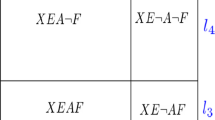Abstract
We reflect on lessons that the lottery and preface paradoxes provide for the logic of uncertain inference. One of these lessons is the unreliability of the rule of conjunction of conclusions in such contexts, whether the inferences are probabilistic or qualitative; this leads us to an examination of consequence relations without that rule, the study of other rules that may nevertheless be satisfied in its absence, and a partial rehabilitation of conjunction as a ‘lossy’ rule. A second lesson is the possibility of rational inconsistent belief; this leads us to formulate criteria for deciding when an inconsistent set of beliefs may reasonably be retained.
Similar content being viewed by others
References
Adams E. W. (1966) Probability and the logic of conditionals. In: Hintikka J. K. K., Suppes P. (eds) Aspects of inductive logic. North-Holland, Amsterdam, pp 265–316
Adams E. W. (1975) The logic of conditionals. Reidel, Dordrecht
Adams E. W. (1996) Four probability-preserving properties of inferences. Journal of Philosophical Logic 25: 1–24
Adams E. W. (1998) A primer of probability logic. CSLI, Stanford
Boole G. (1854) Laws of thought. Dover, New York (Reprinted, 2003)
Hawthorne J. (1996) On the logic of nonmonotonic conditionals and conditional probabilities. Journal of Philosophical Logic 25: 185–218
Hawthorne J., Makinson D. (2007) The quantitative/qualitative watershed for rules of uncertain inference. Studia Logica 86: 249–299
Johnson M., Parikh R. (2008) Probabilistic conditionals are almost monotonic. The Review of Symbolic Logic 1: 73–80
Kraus S., Lehmann D., Magidor M. (1990) Nonmonotonic reasoning, preferential models and cumulative logics. Artificial Intelligence 44: 167–207
Kyburg H. E. (1961) Probability and the logic of rational belief. Wesleyan University Press, Middletown, CT
Kyburg, H. E. (1963). Probability and randomness. Theoria, 29, 27–55 (Reprinted from Kyburg, H. E. (1983). Epistemology and Inference (Minneapolis: Minnesota Press)).
Kyburg H. E. (1970a) Probability and inductive logic. Macmillan, London
Kyburg H. E. (1970b) Conjunctivitis. In: Swain M. (eds) Induction, acceptance and rational belief. Reidel, Dordrecht, pp 55–82
Kyburg H. E. (1997) The rule of adjunction and reasonable inference. The Journal of Philosophy 94: 109–125
Makinson D. (1965) The paradox of the preface. Analysis 25: 205–207
Makinson D. (2005) Bridges from classical to nonmonotonic logic. College Publications, London
Makinson, D. (2011). Conditional probability in the light of qualitative belief change. Journal of Philosophical Logic, 40, 121–153. A preliminary version appeared in Hosni & Montagna (Eds.), Probability, Uncertainty and Rationality vol 10, Springer: CRM Series, Edizioni della Scuola Normale Superiore, Pisa, 2010.
Paris J., Simmonds R. (2009) O is not enough. Review of Symbolic Logic 2: 298–309
Pearl J. (1988) Probabilistic reasoning in intelligent systems. Morgan Kaufmann, Los Altos, CA
Pearl J. et al (1989) Probabilistic semantics for nonmonotonic reasoning: A survey. In: Brachman H. (eds) Proceedings of the First International Conference on Principles of Knowledge Representation and Reasoning. Morgan Kaufmann, San Mateo, CA, pp 505–516
Ramsey, F. P. (1929). Knowledge. Manuscript published posthumously in R. B. Braithwaite (Ed.), The Foundations of Mathematics and other Logical Essays (pp. 258–259). London: Routlege and Kegan Paul, 1931. Most recently republished in D. H. Mellor (Ed.), F.P. Ramsey: Philosophical papers (pp. 110–111). Cambridge: Cambridge University Press, 1990.
Schlechta K. (2004) Coherent systems. Elsevier, Amsterdam
Shoham Y. (1988) Reasoning about change. MIT Press, Cambridge
Venn, J. (1876). The logic of chance (2nd ed). London: Macmillan. The passage from chapter XIV section 36 cited in the first appendix above did not occur in the first edition of 1866; but it is preserved in the third edition of 1886 (reissued in 2006 by New York: Dover Publications), where it is moved to section 33 of the same chapter.
Wheeler G. (2007) A review of the lottery paradox. In: Harper W. L., Wheeler G. (eds) Probability and inference: Essays in honour of Henry E. Kyburg. Jr. College Publications, London, pp 1–31
Author information
Authors and Affiliations
Corresponding author
Rights and permissions
About this article
Cite this article
Makinson, D. Logical questions behind the lottery and preface paradoxes: lossy rules for uncertain inference. Synthese 186, 511–529 (2012). https://doi.org/10.1007/s11229-011-9997-2
Received:
Accepted:
Published:
Issue Date:
DOI: https://doi.org/10.1007/s11229-011-9997-2



